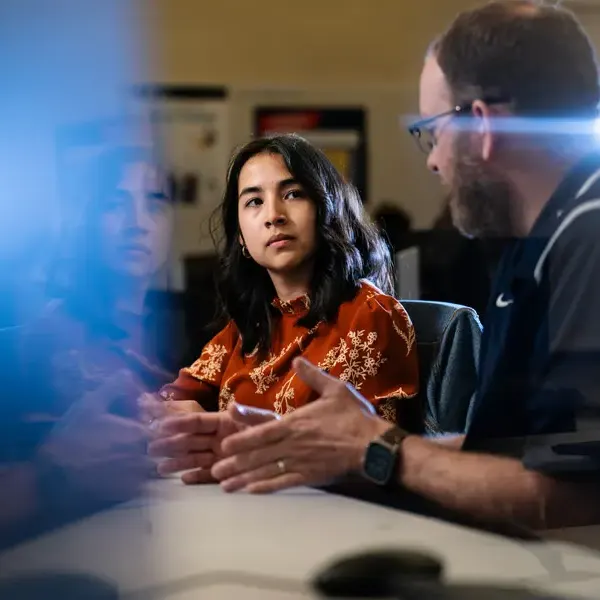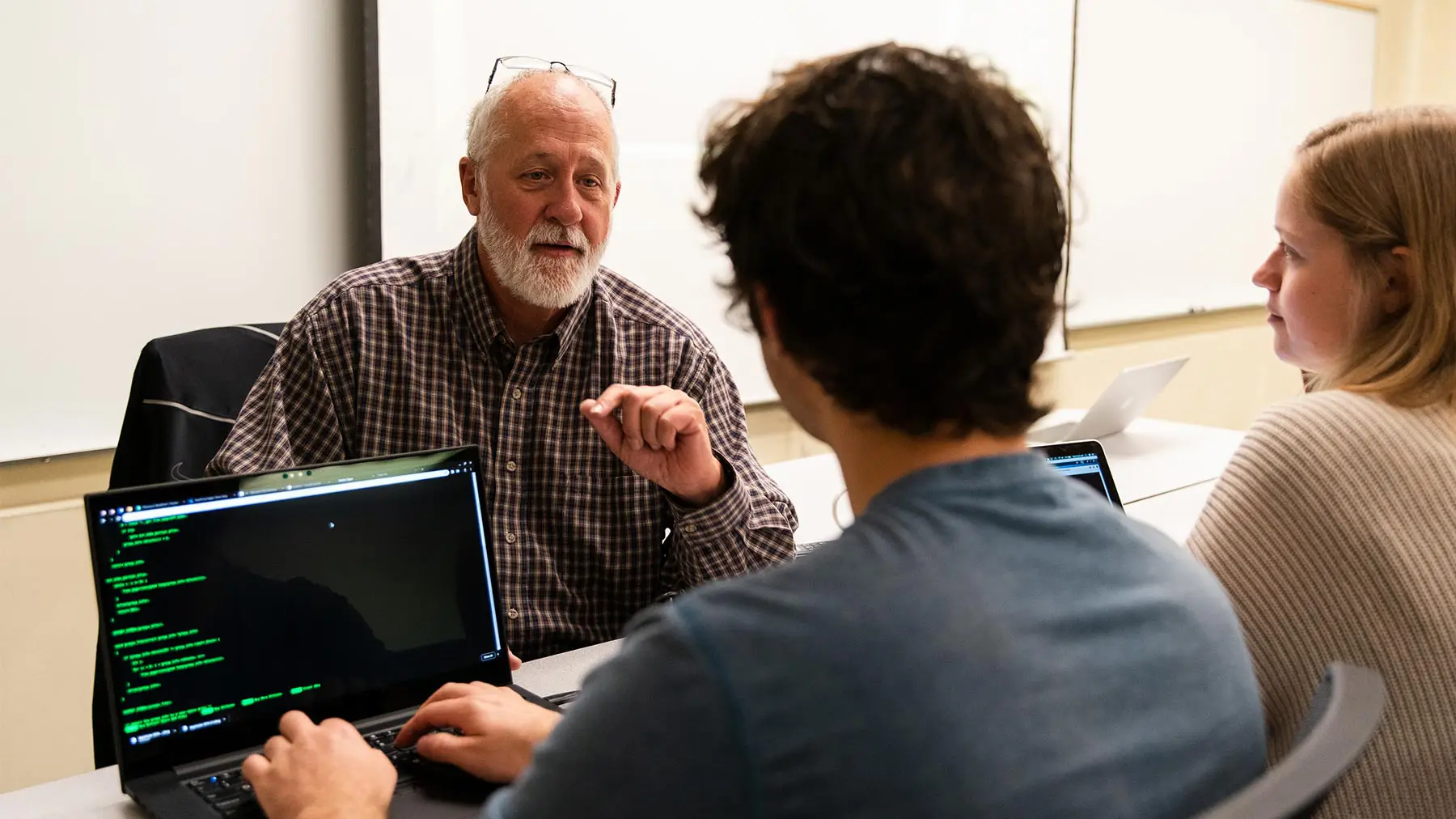Technology is pervasive and will continue to impact our lives on a daily basis. Computers, networks, and information systems play in important role in supporting commerce, banking, telecommunications, healthcare, recreation, high-tech research and development, and many more industries and areas, including public safety and national security.
Every field or profession relies on computer science, information systems, and cybersecurity for the problem-solving skills and production experience required in the efficient and secure processing of information.
Our program is uniquely positioned to prepare you for gainful employment or research work in today’s fast-moving technology-driven society and workplace.
Our Mission and Vision

The mission of our program is to educate students within a Christian environment in the disciplines of computer science, information systems, artificial intelligence & data science, and cybersecurity.
Program faculty are committed to maintaining a curriculum that emphasizes the foundations and basic principles of computer science while exposing students to practical applications and current computing hardware and software technology.
The vision for our program is twofold:
- First, to educate and nurture students who will become persons of influence, continually growing in stature with God and man.
- Second, our faculty seek to be people of increasing influence both in the lives of our students as well as the larger community at George Fox University and beyond to our technology-driven society.
Program Details
We’ve gathered additional information about our program to help answer any questions you may have:
FAQ
Still have questions? Here are answers to some of the most frequently-asked questions we’ve received from prospective and incoming students and their families:
Computer science (CS), in the words of Aho and Ullman, is “[fundamentally] a science of abstraction—creating the right model for thinking about a problem and devising the appropriate mechanizable techniques to solve it.” CS is not primarily about programming, although computer scientists express solutions to problems via programs that can be executed by computing machines. Ultimately, the science of computing seeks to address the question of what can be automated and how to do so, with an eye toward optimal and elegant solutions.
Students studying CS at George Fox University are introduced to the fundamental principles and mechanisms of modeling, abstraction, and problem solving using computers. The knowledge of these principles, rooted in mathematics, logic, and language, prepares students to understand the essence of the science of computing and to continue to adapt to this evolving field. Along the way, students will be introduced to a wide range of state-of-the-art programming languages and techniques, software systems, computing devices, and computing technologies.
The curriculum begins with a first-year sequence of courses that introduce students to programming and problem solving in modern programming languages using both structured and object-oriented techniques—no prior programming experience is assumed or required. Students typically begin the sequence in the fall of their freshman year.
After the introductory sequence, the curriculum includes a wide variety of courses that cover the core elements of a traditional CS topics including data structures, algorithms, software engineering, database systems, computer architecture, operating systems, and so on. The curriculum culminates in a two-semester senior design capstone in which students complete a non-trivial, real-world software and/or hardware engineering project in conjunction with a industry project sponsor.
Our program at George Fox is a small, diverse, close-knit group of faculty, staff, and students who develop meaningful relationships during their time together. The setting is ideal for students seeking a smaller, more intimate program where they can receive more personal attention and instruction, in alignment with the university’s Be Known promise. Classes have small enrollments (typically 15 or less for upper-division courses) and are taught exclusively by program faculty who have broad experience in industrial and academic settings and remain active and current via consulting relationships with industry and through academic research.
Our curriculum covers the core elements of a CS education as put forth in Computing Curricula, a set of recommendations published jointly by the Association for Computing Machinery (ACM) and the Computer Society of the Institute for Electrical and Electronic Engineers (IEEE-CS). We do not aspire to simply train students in the implementation and use of technology, but to broadly educate students in the discipline of computer science.
Despite our small size, our program has dedicated facilities in the form of two laboratories located in the Edwards-Holman Science Center. Our labs are routinely upgraded with modern computing equipment for exclusive use by students majoring and minoring in CS and other disciplines within the College of Engineering.
In addition, our students benefit from our being a part of the College of Engineering, enabling them to include elective courses in relevant computer and electrical engineering subjects such as digital logic, robotics, and microprocessors.
Prospective students are invited to contact any of the faculty with questions about CS at George Fox—we'd love to hear from you and would be happy to answer any questions you have about pursuing a degree in CS here at the university.
Yes; see our dedicated page for transfer students. We will work with you individually to determine how to best handle your specific situation.
In general, students with some introductory CS courses already completed typically still start in our introductory courses, or repeat a second-year course in our program (e.g., data structures or algorithms) to ensure a solid foundation; students with significant coursework already completed at a four-year institution typically start in our upper-division courses.
Yes! See our dedicated page for scholarships offered by the department each year.
Strictly speaking, you do not need to bring any hardware to complete your coursework, as our program has computing resources available in our labs on campus. Our program uses a wide variety of hardware and operating systems (e.g., Windows, macOS, Linux), and course projects are often implemented using open-source software available across platforms. We are also a member of the Microsoft education program (also known as MSDNAA, DreamSpark, Imagine, or Azure Dev Tools for Education), providing free access to all Microsoft development tools and resources for our students.
That said, most students do choose to bring their own resources, specifically a laptop for working on assignments and projects at various locations on campus, including student housing. 2-in-1 devices (e.g., Microsoft Surface, ThinkPad Yoga) with a stylus are popular among students across campus for their innate digital note-taking capabilities. The choice of hardware and operating system is largely up to you—we'll expand your horizons regardless of what you choose!
Note that, while useful for general note-taking, time management, task organization, and light productivity tasks, devices such as Apple iPad, various Android tablets, or Chromebooks generally do not support various tools (e.g., integrated development environments, version control systems, command-line interfaces) used in most CS courses. Some especially tech-savvy students can always find ways to augment the abilities of such devices, but in general, do not expect a tablet or Chromebook to support everything that you might need to install.
For students choosing our cybersecurity concentration, a machine with sufficient resources to run virtual machines (such as a quad-core CPU and at least 16 GB of RAM) is preferable. Additionally, most of the cybersecurity coursework requires the use of an Intel (or AMD) x86-based CPU—and is therefore not supported or even possible at all on recent Apple machines (i.e., Apple silicon/ARM-based, rather than Intel x86-based machines).
Finally, please know that students always have access to sufficiently-configured machines in our labs on campus—you are not required in any way to purchase a top-spec laptop (sorry, those of you who are hoping parents or grandparents will spring for a fully loaded gaming rig).
Despite what many prospective students and parents have heard, jobs in CS are plentiful, and opportunities for further study at the graduate level abound. As the U.S. Department of Labor’s Bureau of Labor Statistics notes, the outlook for job growth in our industry is excellent, with median annual wages more than double that of the average for all other occupations—making a bachelor’s degree in CS a good investment for your future.
Many of our alumni immediately enter the workforce, while a select few others continue on to graduate studies in CS. Our proximity to the high-tech sector surrounding the Portland metropolitan area offers many opportunities for employment. Several students successfully obtain internships with local or regional high-tech employers that become full-time positions upon graduation.
We welcome your questions! Feel free to contact us by email at jmccollum@georgefox.edu or call 503-554-2777.
